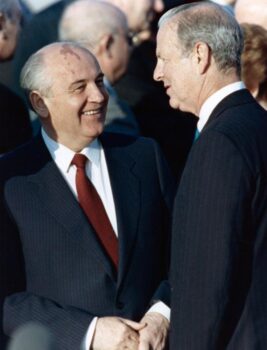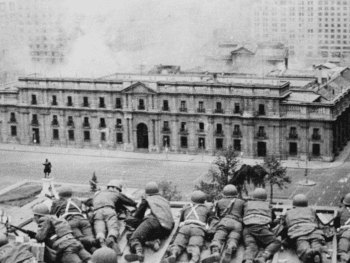
Somalis protest U.S. support for the Ethiopian invasion of their country. This U.S.-backed war killed tens of thousands of Somalis. (Photo: Al Jazeera)
The 20th century muckraking journalist Upton Sinclair once opined that “It is difficult to get a man to understand something, when his salary depends on his not understanding it.” With this in mind, it is easy to understand why a small but powerful class of war profiteers might not acknowledge or seek to educate the public about the nefarious nature and immorality of U.S. empire.
Furthermore, members of the military-industrial complex certainly have no interest in the rest of us gaining understanding of the truth of U.S.-inflicted violence. However, for the majority of Americans whose finances are not dependent on violent global domination, this wall of ignorance provides no benefit and, thus, needs to be dismantled.
The reality is that the fortress of American exceptionalism rests on a foundation of assumptions that are easily disproved with the application of basic interrogation. Serious consideration of the following questions will go a long way to disabuse U.S. citizens of the altruistic nature of U.S. hegemony.
1. Does the United States Actually Oppose the Behaviors It Claims to Oppose?
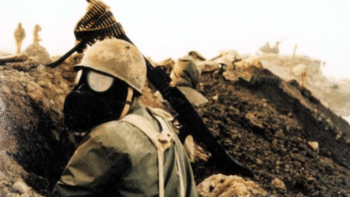
Iranian troops were often subjected to chemical weapons attacks during the Iran-Iraq war, a war initiated by an Iraqi invasion of the Islamic Republic. As Saddam Hussein’s forces perpetrated these crimes, the United States continued to lend him full diplomatic and armed support. (Photo: pri.org)
This question is especially important because U.S. aggression toward weaker nations is often justified through allegations of nefarious actions committed by the targeted country. However, the idea that the U.S. government actually opposes these transgressions crumbles when examining the behavior of U.S. allies as well as the actions of the United States itself.
An analysis of U.S. violence, along with the stated reasoning by U.S. officials for those actions, is revealing. Take the 1991 Gulf War, perpetrated by the George H.W. Bush administration on Saddam Hussein’s Iraq. This was launched because Iraq had invaded Kuwait, violating the UN principle of respect for territorial sovereignty. While Iraq’s incursion into Kuwait—though rooted in disputed colonial borders—was an affront to international law, the outrage of the U.S. was extremely selective. Both before and after, the U.S. regularly supported far more destructive invasions than Iraq’s into Kuwait.
These included the 1975 Indonesian invasion of East Timor and the South African invasion of Angola in the same year. The U.S. also backed the 1990 Rwandan Patriotic Front’s invasion of Rwanda by way of Uganda—which the U.S. Ambassador to Rwanda, Robert Flaten, had objected to—as well as the 2006 Ethiopian invasion of Somalia.

The U.S. invasion of 1989 brought devastation to Panama, killing up to 3,000 people and displacing at least 20,000. (Photo: Wikipedia)
Just a few years years before being deemed a pariah by the U.S., Iraq itself had enjoyed U.S. support in the form of arms, intelligence and diplomatic support when it invaded the Islamic Republic of Iran, resulting in more than a million deaths.
Even more egregiously, just a year prior to Iraq’s venture into Kuwait, the U.S. itself earned the condemnation of the UN for invading Panama for the purpose of making a drug arrest of former CIA asset Manuel Noriega. That war, curiously dubbed “Operation Just Cause,” killed up to 3,000 civilians as the U.S. military pummeled Panama City with air power.
In 2018, the United States bombed Syria over the (highly disputed) claims that the government of Bashar al-Assad had used chemical weapons within the context of the Syrian civil war. Again, even a superficial review of recent U.S. history reveals a very narrow objection to this alleged crime. One would be hard-pressed to find a more destructive example of chemical warfare in the human record than the Kennedy, Johnson and Nixon administration’s use of Agent Orange in Laos, Cambodia and Vietnam in the 1960s and 1970s.

The United States’s use of the defoliant chemical Agent Orange devastated the people and environments of Vietnam, Laos and Cambodia. (Photo: technologyworks.com)
The defoliant destroyed tens of thousands of square miles of forest, contaminated drinking water, and caused birth defects and maladies for generations thereafter.
Equally abhorrent was the United States’s use of depleted uranium encased ammunition in the 1999 war on Serbia and the 2003 war in Iraq.
The devastating toll of this practice can be seen in the Iraqi city of Fallujah. In the years since depleted uranium was deployed in the 2004 U.S. attack on the city of nearly 300,000, cancer rates have skyrocketed.
Additionally, birth defects have risen to levels higher than those seen in Nagasaki in the years following the atomic bombing of 1945. Contrary to objecting to the use of chemical weapons, history shows that the U.S. simply prefers that it maintain a monopoly on the practice.

Children born generations after the Vietnam War still suffer genetic deformities due to the U.S. deployment of Agent Orange. (Photo: Daily Mail)
The United States’s feigned opposition to violations of territorial sovereignty and use of chemical weapons are emblematic of a larger trend. Nearly all of the actions of other nations that the American populace is led to believe warrant U.S. violence are actions that the United States either engages in itself or supports its allies to do. A longer list would also include alleged concerns over genocide, women’s rights violations, torture, harboring terrorists, imprisoning journalists, and narco trafficking.
2. Does the United States Seek Peace?
Often taken for granted is the assumption that the United States government desires peace. Just as individuals, governments’ values are best indicated not through rhetoric but by behavior. If peace were truly a priority, one would expect the United States to take every possible opportunity to avoid war. The evidence overwhelmingly contradicts this notion. Most strikingly refuting this notion is the fact that the United States has been at war in all but 11 years of its 245-year existence. Far from defensive violence, nearly all of these wars have been aggressive wars of choice.

In Fallujah, Iraq, cancer rates and birth defects have skyrocketed since the U.S. military’s use of depleted uranium encased ammunition in 2004. (Photo: ALJazeera)
Furthermore, if peaceful coexistence with the world’s people were a goal, one would expect that, when periods of international tension arose, the U.S. government would exhaust every possible option before initiating violence. Far from this, historically the United States has often employed violence when other choices were available. Prior to George W. Bush launching the 2003 war on Iraq based on false pretexts, Saddam Hussein’s government offered diplomatic solutions.
In the month preceding the invasion and destruction of their nation, Iraqi intelligence attempted to satisfy the United States by offering a variety of overtures to the superpower. These were concessions that the Iraqis believed would alleviate any need for violence on the part of the U.S. They included offers of:
- Providing full cooperation with the U.S. in combatting terrorism;
- Allowing U.S. law enforcement unlimited access to conduct inspections for weapons of mass destruction;
- Holding UN-supervised elections;
- Assisting with the Arab-Israeli peace process; and
- Giving the U.S. first priority in oil and mining rights.
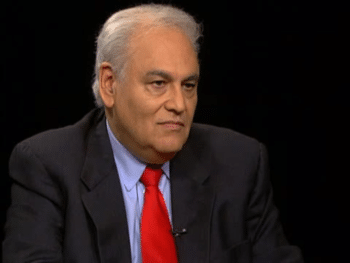
Neo-conservative Richard Perle served as a Pentagon adviser to the Bush administration and reportedly provocatively responded to Iraq’s attempt at peace with “Tell them that we will see them in Baghdad.” (Photo: charlierose.org)
Hussein’s government must have been under the misguided assumption that the United States would only choose war as a last resort, one of the most basic principles of the millennium-old Just War theory. However, the 2003 war on Iraq had been desired and planned for by the neo-conservative clique in the U.S. government since the late 1990s.
No diplomatic offer was going to assuage the bloodlust of the Bush administration. This was illustrated in response from Pentagon adviser Richard Perle upon being notified of Iraq’s attempts at diplomacy: “Tell them that we will see them in Baghdad.”
Had Hussein been a more informed student of U.S. history, he would have understood that war has always been the preferred path for the superpower. Just two years earlier as the War on Terror began, the Taliban of Afghanistan had offered to give up Osama bin Laden numerous times. The United States refused those offers, electing to launch a 20-year war on the impoverished people of Central Asia instead.

The United States war in Afghanistan could have been avoided. The Taliban offered to give up Osama bin Laden but they were rebuffed by George W. Bush. (Photo: ABC News)
Prior to that, in 1999 the U.S. and NATO sabotaged a potential peace process in the former Yugoslavia. As tensions had erupted into violence between the Serbian government of Slobodan Milošević and ethnic Kosovars, the West saw an opportunity. Preferring war to peaceful negotiation, the “peace” proposal offered by U.S. Secretary of State Madeleine Albright all but guaranteed war.
The Rambouillet Agreement contained stipulations that Serbia would allow for a military occupation of the country by NATO troops, a condition that no sovereign government on earth would accept. The deal crafted with the purpose of ensuring war was indeed rejected. Serbia was subsequently subjected to a 78-day NATO bombing campaign which killed hundreds of civilians and completed the dissolution of the former Yugoslavia.
The above examples are demonstrative of a larger pattern of the U.S. consciously avoiding peace while starting or continuing wars. The list of such occurrences is long and extends to more recent occasions, such as in Libya in 2011 and Syria in 2012. In both of these cases, the U.S. was again granted offers for cessations of violence but declined to take the opportunities.

The Rambouillet peace summit was essentially a “fake peace summit” designed to lay the groundwork for the U.S.-NATO bombing of Kosovo. [Photo: news.bbc.co]
The U.S. was given an off ramp from the path of aggression toward Iran in 2003 when the Islamic Republic offered what was referred to as the “Grand Bargain.” This included offers to negotiate its (civilian) nuclear program, cooperate in the U.S. War on Terror, and a reconsideration of its regional relationships with groups including Hezbollah. The offer was left unanswered and aggression toward the Iranian people continues to the present day.

Libyan leader Muammar Gadaffi was lynched by U.S.-backed forces in 2011 and the nation has since fallen into chaotic violence. This war was avoidable as more peaceful options proposed by African leaders were ignored by the U.S. (Photo: The Telegraph)
The same phenomenon is evident in the U.S. relationship with Russia.
The current cold war with Russia can be attributed to U.S. aggression in the form of NATO expansion to the Russian border. However, back in 1990, as the USSR collapsed, Secretary of Defense James Baker promised former Soviet Premier Mikhail Gorbachev that the North Atlantic military alliance would not advance “one inch” to the East of the former East German border.
The anti-Russian military alliance has since expanded more than 1,000 miles right up to the Russian doorstep. Along the way the military alliance has incorporated Poland, the Baltic states, and has even threatened to absorb Ukraine and Georgia.
One need only imagine how the United States would react were the Russians to develop a Warsaw Pact 2.0 that included Mexico, Canada or any of the Caribbean nations. Needless to say, the common view amongst U.S. officials in that scenario would not be that Russia is simply pursuing peace.
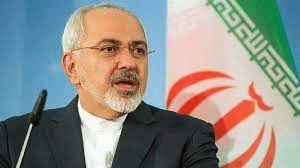
Iranian Ambassador to the UN (now Foreign Minister) Javad Zarif reportedly played a top role in proposing the “Grand Bargain” rapprochement with the United States in 2003. He was ignored. (Photo: Tehran Times)
Lastly when discussing a nation’s priorities, how it allocates funds within its budget is instructive. No reasonable person could draw the conclusion that the United States values peace when presented with the reality of its military spending.
The United States dedicates roughly half of its discretionary spending to war. The $753 billion dedicated to the Pentagon is equal to the sum of military spending of the next ten nations combined. This starkly contrasts with the spending on the entity which is supposed to be dedicated to diplomacy; the U.S. Department of State receives a comparatively miniscule $58.5 billion.
Combine that with the fact that the United States is, at $175 billion, by far the largest exporter of arms in the world, and the assumption that the superpower seeks peace seems downright absurd. Rhetoric from U.S. leaders proclaiming aspirations for peace are simply not matched by the historical record, current behavior, or allocation of resources.
3. Does the United States Care about Democracy?
The “D” word is often brandished by U.S. leaders while pursuing aggression against the people of the Global South. Criticisms of the undemocratic nature of governments have been used to justify interventions in a plethora of nations, including Venezuela, Panama, Grenada and Haiti. However, once again this rhetoric is out of sync with the historical record of the actual behavior of the United States.For a nation whose leaders have self-appointed themselves as the defenders of democracy, the United States seems to keep some rather undemocratic company. To start with, the United States currently provides arms to 73% of the world’s dictatorships. This provision of weaponry is often also accompanied by the training of military or security forces of these undemocratic governments.
Needless to say, the U.S.-trained security forces of dictatorships are frequently deployed against their own populations, committing atrocities against civilians in what is often referred to as “counterinsurgency.” U.S.-trained security forces also have a nasty habit of perpetrating coups. In the period from 1970 to 2009, 275 (decidedly undemocratic) military-backed coups took place globally. Of those, U.S. trained forces carried out 165 of them.
A brief examination of the U.S.’s closest allies and partners in the Middle East and North Africa should also dissuade one of the notion that democracy is an animating value in U.S. policy making. Across the region the U.S. has found useful imperial surrogates in a variety of autocracies, military dictatorships, apartheid states, and monarchies.
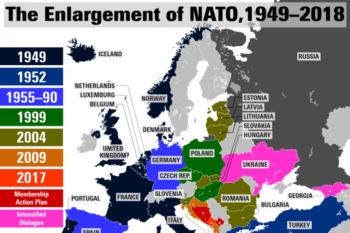
Since the end of the Cold War, the anti-Russian NATO military alliance has added 14 member nations, including nations on Russia’s border. (Photo: Monthly Review)
In Egypt the U.S. has proved a consistent ally to undemocratic governments, first supporting the dictator Hosni Mubarak for decades until his downfall due to popular uprising in 2011. Since 2013, the military dictatorship of Abdel Fattah Al-Sisi had enjoyed the backing of the superpower, even after his forces brutally massacred more than 800 citizens in 2013.
The United States currently provides an unconditional 3.8 billion dollars along with ceaseless diplomatic coverage at the UN to the apartheid state, Israel. Given this fact, it should not come as a shock that the U.S. had previously supported apartheid-era South Africa. This relationship even saw the U.S. classify anti-apartheid revolutionary Nelson Mandela as a terrorist. This characterization was maintained by the State Department until 2008.
Elsewhere in the Middle East, the last remaining monarchies on earth repress their internal populations, and wage war on their neighbors with U.S. complicity. The royal families of Bahrain, Saudi Arabia, Jordan and the United Arab Emirates enjoy immense privilege and wealth while their domestic populations suffer in destitute poverty.
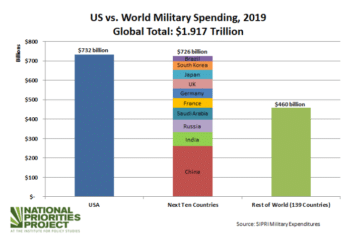
The U.S. spends more on war than the next ten nations combined. This seems like odd behavior for a nation allegedly dedicated to peace. (Photo: The National Priorities Project)
These governments also maintain oppressive policies such as public crucifixions and beheadings, persecution of members of the LGBTQ community, and extreme repression of women. Such autocratic societies can only be maintained with the assistance of the world’s strongest superpower.
The right of a nation’s people to select their own government via elections would seem to be a basic tenet of democracy. Yet in its time as a superpower since 1945, the U.S. has constantly interfered in foreign elections in an effort to assure a favorable result.
Since World War II, Uncle Sam has attempted to meddle in electoral contests in more than 81 nations. The imperial mindset of U.S. leaders was revealed in 2006 after elections in Gaza resulted in Hamas winning over the U.S.-preferred Fatah party.
Regarding the Palestinian electorate’s having defeated the self-anointed right of the U.S. to pick their leadership, then New York Senator Hillary Clinton lamented,
if we were going to push for an election, then we should have made sure that we did something to determine who was going to win.
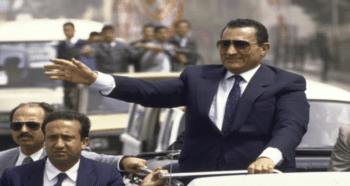
The brutal dictatorship of Egyptian strong man Hosni Mubarak received U.S. support for decades until he exited power in 2011. Now, the U.S. supports his successor, Fattah al-Sisi. (Photo: The Times)
With this comment, the eventual Secretary of State was exemplifying the Mafia Don mentality that is the dominant orthodoxy of the U.S. elite.
In other cases wherein the collective will of the citizenry of foreign nations triumphed over U.S. desires, more drastic forms of sabotage were employed.
This has most often occurred when the popular governments of nations of the Global South have had the audacity to implement policies in favor of the poor, such as land reform or nationalization of their natural resources.
In such cases, the U.S. has resorted to the most undemocratic of practices, using subversive means to overthrow democratically elected governments around the world.

Anti-apartheid revolutionary Nelson Mandela was considered a terrorist by the United States until 2008. This classification was part of the larger pattern of U.S. support for apartheid South Africa. (Photo: Time Magazine)
The people of Iran, Guatemala, Brazil, Chile, Honduras and a host of other nations are more than familiar with the asymmetry that exists between speech and action when it comes to the United States and its alleged concern over democratic practices.
Revealing Hypocrisy Is Not an End on Its Own
The ability to answer the above questions is useful in the sense that it highlights the contradiction between commonly held assumptions and the truth about U.S. policy.
However, drawing the (correct) conclusions that U.S. foreign policy is not animated by concerns about human rights abuses, a desire for peace or a mission to “make the world safe for democracy,” is only a starting point in developing a vibrant anti-imperialist movement in the United States.
This initial act of challenging and eradicating the foundational assumptions that form American exceptionalism is an imperative step.
The mythology of U.S. magnanimity is one of the primary psychological barriers to further confronting imperialism. These walls of fiction are erected in most Americans’ minds through a lifetime of propaganda that is disseminated through education, entertainment, and news media, and thus are difficult to penetrate.
However, once these walls are breached, a systemic analysis of capitalism and the military-industrial complex becomes possible. Indeed, no one is likely to engage in boycotts, protests, or other forms of direct action against the empire without first reducing its wall of mythology to rubble. With a critical mass of people attuned to its flawed ideological foundations, the violent hegemony of the U.S. cannot persist.
Matt McKenna is a teacher in Bergen County New Jersey and teaches AP United States History. Prior to that job, he was a teacher for a decade in the Bronx (2007-2017).


